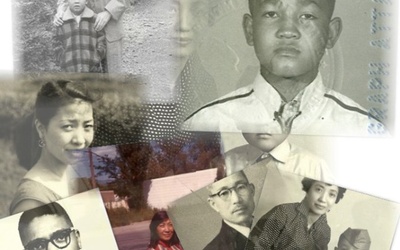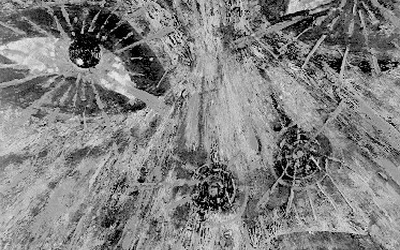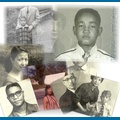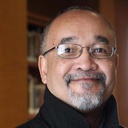
Fredrick Cloyd
@FredrickKakinamiFredrick Douglas Kakinami Cloyd nació en Japón poco después de que terminara oficialmente la ocupación estadounidense. Su padre afroamericano/cherokee era un soldado de ocupación en Corea y Japón, mientras que la madre de Fredrick, una niña japonesa/china/austrohúngara de las ruinas de la guerra, pertenecía a una familia nacionalista de élite en Japón. Los racismos y sexismos transnacionales durante el ascenso de la estatura global de Estados Unidos y Japón presentan una base a través de la cual Fredrick teje sus historias de memoria e historia familiar.
Recibió una maestría de un programa de antropología social cultural de orientación poscolonial/feminista en el Instituto de Estudios Integrales de California en San Francisco. Alimenta su amor por la comida asiática y latina, el café, los programas de televisión, la música y los trenes de vapor mientras trabaja en su primera autoetnografía intersticial titulada: “Sueño con los niños del agua, sueño con los niños del agua”.
Actualizado en mayo de 2011
Historias de Este Autor
Part 6: Constant King [2 of 2]
5 de agosto de 2011 • Fredrick Cloyd
Read “Part 6: Constant King [1 of 2]” >>How, then, are manhood, fatherhood and hierarchies constructed in this? It’s not just one thing. You’re too young to remember, I think. One time I was giving you a bath. It was at our house in Ōme. Your Dad came to Japan to see how we were doing, a year after he was here for your birth. We were still waiting for the American government to let us marry. Until then, your …
Part 6: Constant King [1 of 2]
29 de julio de 2011 • Fredrick Cloyd
Read “Part 5: Monsters” >>The Constant King 1964Mama and Dad and myself are at the dinner table. It was really the first full year ever, that Dad sat at the dinner table with Mama and I for a meal or two. In the past, he had been out of the country where Mama and me lived. When I was born it wasn’t good that he was with us, according to the military. So he was in America and Korea. In …
Part 5: Monsters
22 de julio de 2011 • Fredrick Cloyd
Read “Part 4: Neighbors/Next Door” >>Monsters 1950 Shōwa Year 25化け物 昭和25年From a leaflet from the U.S. armed forces made available to the occupation soldiers during the strongest period of attempting to implement the anti-fraternization policy which tried to discourage relations between Japanese women and occupation personnel: “[Japanese women] have been taught to hate you. They do as their men tell them, and many of them have been told to kill you. Sex is one of the oldest and most effective …
Part 4: Neighbors/Next door
15 de julio de 2011 • Fredrick Cloyd
Read “Part 3: Watermelon Seeds [2 of 2]” >>Neighbors/Next door, Mama around 1940となり、昭和15年ごろ“These expressions are extremely crude and regional, and have a rustic air; middle-class Tokyo residents would laugh at their provincial quaintness.” —Dorinne Kondo1 We were obviously not 江戸っ子 Edokko.2 People reminded us that we were foreign and special, even though we were Japanese. Older sister spoke louder than other girls around and liked to be around the girls who were always in trouble at school and were …
Part 3: Watermelon Seeds [2 of 2]
8 de julio de 2011 • Fredrick Cloyd
Read “Part 3: Watermelon Seeds [1 of 2]” >>I am still an only-child. But now my only child identity was not the same as just a moment before. I was born alone but because a sister died. Fragments of unknowns become apparent. I then felt relieved. Some things fell into a certain logical reasoning—or perhaps it was a certain logic that offered comfort. I was an only child, but now I reasoned that a protector-twin had been watching over me, …
Part 3: Watermelon Seeds [1 of 2]
1 de julio de 2011 • Fredrick Cloyd
Read “Part 2: The Waters [2 of 2]” >>Watermelon seeds, 1964 Shōwa Year 39スイカの種、1964年 昭和39年“One of the remarkable features of this group is that it seems that all the war children receives[sic] a stigma, whether the father was an enemy soldier or an allied…We have to understand that this stigma often is associated with the status of the mother.” —From: The War Children of the World1 Lovers—a Japanese man and the French woman, speak: He: You saw nothing in Hiroshima. …
Part 2: The Waters [2 of 2]
24 de junio de 2011 • Fredrick Cloyd
Read “Part 2: Waters [1 of 2]” >>The Waters (continued)Denver, Colorado 1982 “Hey Boy!…Yeah, You. I’m talking to you Boy!”1 “Yes, officer,” I say to the policeman who had just called out to me at 11:00 at night as I walked home from volleyball practice at the YMCA. The flashlight is shone onto my face as I turned to face him. He sees I’m in a blue warm-up suit with my Onitsuka Tiger (now called Asics) sports bag. There are …
Part 2: The Waters [1 of 2]
17 de junio de 2011 • Fredrick Cloyd
Read “Part 1: Preface” >>The Waters“What am I doing here in this endless winter?” —Franz Kafka, from The Metamorphosis and Other Stories My brown body began writing the Japanese character “水” water when I was four years old. I began writing Chinese characters before I knew any of the more simple phonetic kana characters of Japanese language around that time. I hadn’t even heard of English then. And what I knew of China directly, were my Mama’s Chinese friends in …
Part 1: Preface
10 de junio de 2011 • Fredrick Cloyd
This is an anthropology of memory, a journal and memoir, a work of creative non-fiction. It combines memories from recall, conversations with parents and other relations, friends, journal entries, dream journals and critical analysis. To learn more about this memoir, read the series description. The Dream “To say that a life is precarious requires not only that a life be apprehended as a life, but also that precariousness be an aspect of what is apprehended in what is living.” —Judith Butler, …
Snowflakes in a Valley of Fire
4 de mayo de 2006 • Fredrick Cloyd
My mother told me one day that fear was useless in her life. Her statements confront what many of us believe peace should be—obedience, disciplining ourselves to be docile, good citizens, with fear not far behind our actions. Fear of not being seen as an American, fear of being interned again at the drop of a hat, fear of doing ‘wrong’ in the eyes of the US government or Japan—fear has been a constant presence for many Japanese Americans. My …

![Thumbnail for Part 6: Constant King [2 of 2]](https://devmedia.discovernikkei.org/cache/db/9a/db9a76bfa18f9490e494f486f64512db.jpg)
![Thumbnail for Part 6: Constant King [1 of 2]](https://devmedia.discovernikkei.org/cache/62/17/6217bb1959862992c0fa06102b0fa6d6.jpg)
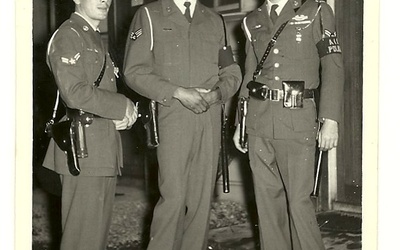
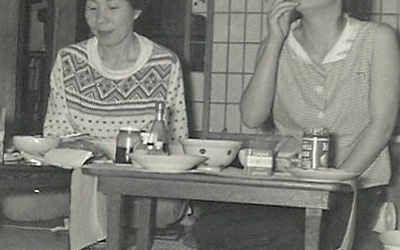
![Thumbnail for Part 3: Watermelon Seeds [2 of 2]](https://devmedia.discovernikkei.org/cache/9d/f0/9df0d7061a12355f20bb8ba7a7ebc6ab.jpg)
![Thumbnail for Part 3: Watermelon Seeds [1 of 2]](https://devmedia.discovernikkei.org/cache/4a/05/4a056fdbaaa352626f4f66cc41cba99d.jpg)
![Thumbnail for Part 2: The Waters [2 of 2]](https://devmedia.discovernikkei.org/cache/41/9c/419cc5a1b8862f250322399e7d787e09.jpg)
![Thumbnail for Part 2: The Waters [1 of 2]](https://devmedia.discovernikkei.org/cache/e4/cf/e4cfdb32f68db68cc730bb1c4e2dc554.jpg)
